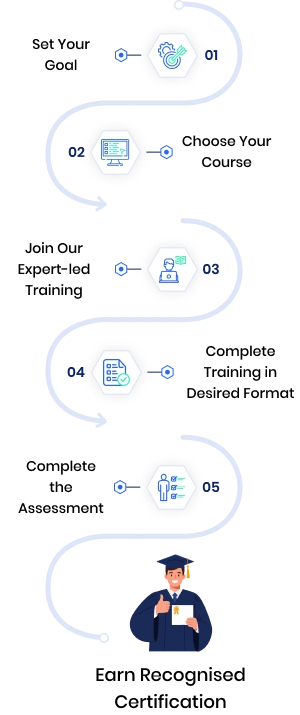Course Overview O v e r v i e w
- Course Overview
- Course Outline
- What’s Included
- What You’ll Learn
- Exam Details
Agile Project Management Foundation (AgilePM® v3) Overview
The Agile Project Management Foundation Course introduces learners to the fundamental principles, roles, and processes of Agile project delivery. It focuses on iterative planning, stakeholder collaboration, and adaptive project control, making it ideal for professionals working in fast-paced, change-driven environments. The course provides a solid grounding in Agile methodologies, enabling participants to contribute effectively to Agile teams.
Formal training in Agile project management equips individuals with a structured understanding of Agile frameworks and best practices. It enhances confidence in managing uncertainty, improves communication within teams, and supports the delivery of customer-focused outcomes. Certification also adds credibility to your professional profile, opening doors to new roles and career progression in Agile-led organisations.
Training Deals offers a distinctive learning experience by combining expert instruction with practical, real-world examples tailored to Agile environments. Their Foundation course is designed for accessibility, with flexible learning formats, high-quality resources, and dedicated learner support. Whether you're new to Agile or looking to formalise your knowledge, Training Deals ensures a clear, engaging, and career-focused path to certification.

Agile Project Management Foundation (AgilePM® v3) Outline
Module 1: Key Concepts (KC)
- Definition of Business Agility
- Meaning Of VUCA
- Agile Manifesto and Its Enhancement for The Agile Project Context
- Scope of Product Development
- Scope of Project Management
- Why Agility Is Needed in Project Delivery
- How Agility Helps Deal With VUCA
- Values in The Manifesto
- Significance of The Final Sentence in The Manifesto
- Manifesto Principles Enhanced for The Agile Project Context
- How Project Management Differs to Product Development?
- Characteristics of An Agile Approach for A Project
- Why Agility in Project Management Is Always the Best Approach?
Module 2: Scrum Overview (SC)
- Definition of Scrum
- Scrum Values
- Scrum Team Roles and Purpose
- Name and Purpose of the 5 Scrum Events
- Scrum Artefacts and Commitments
- Scrum Theory (The Three Pillars of Empiricism)
- Scrum Events
- Scrum Artefacts and Commitments
Module 3: AgilePM Fundamentals (AF)
- AgilePM Philosophy
- Underlying Ethos of AgilePM
- How AgilePM Approaches The 4 Project Variables
- AgilePM's 8 Principles - Rules of Engagement
- AgilePM And Projects in the 'Real World'
- AgilePM's 8 Principles - Rules of Engagement
- In Combination with Scrum, What AgilePM Provides
Module 4: Individuals and Interactions (IN)
- 9 Principles of Agile Leadership
- Definition of a Stakeholder and the 3 Classes Identified:
- Project Leadership Roles
- Solution Development Roles
- External Stakeholders
- Names of The AgilePM V3 Roles:
- Leadership
- Team-Based
- Accountabilities of The Scrum Master
- What Is Agile Leadership
- How The 9 Principles of Agile Leadership Are Applied
- Interactions Between Stakeholders and What Influences These
- Project Leadership Roles and Responsibilities:
- Business Sponsor
- Business Visionary
- Solution Architect
- Project Manager
- Product Owner
- Product Owner's Relationship with the 4 Key Stakeholders:
- Business Visionary
- Solution Architect
- Project Manager
- Business and Technical Advisors
- Role of The Product Owner in An Agile Context
- How the Scrum Master Serves the Project Team
- Team-Based Delivery Roles and Responsibilities
- Key Project Manager's Relationships:
- Business Sponsor
- Business Visionary
- Solution Architect
- Product Owner
- Scrum Master
- Other Stakeholders
Module 5: Collaboration and Communication (CC)
- Collaboration
- Definition
- What It Involves?
- Characteristics of Individuals Working Collaboratively
- Communication
- Definition
- Poor Communication and Project Failure
- Communication Choices
- Jim Highsmith: "Documentation Is Not Understanding, Process Is Not Discipline, Formality Is Not Skill."
- Effective Collaboration in The Context of a Project:
- Benefits
- Building Competence
- Leading A Collaborative Team
- Effective Communication in The Context of a Project:
- Skills, Language and Technology
- Communication Planning
- Communication Choices
- Transparency of Process and Progress
Module 6: Project Lifecycle Framework (PR)
- Defining and Distinguishing Between Types of Increment
- Project Lifecycle
- Purpose, Work and Potential Work-Products for Each Lifecycle Phase:
- Pre-Project
- Feasibility
- Foundations
- Development
- Deployment
- Post-Deployment
Module 7: Requirements, Estimating and Prioritisation (ES)
- Key Concepts and Hierarchy of Requirements, Goals, Backlogs, Solutions, Products and Increments
- Definition of A Requirement and The Different Types
- User Stories
- Format (As A, I Want, So That)
- Composition (4 Cs)
- INVEST (Acronym Labels and Description)
- MoSCoW Rules
- Definition Of M, S, C And W
- Guidance In %ages Of Effort for M And C
- Requirements:
- Identifying Requirements
- Writing User Stories
- Working with Requirements Throughout the Project Lifecycle
- Estimating in An Agile Environment:
- Coping With VUCA
- Styles of Estimating
- Estimating Cycle
- Estimating Throughout the Project Lifecycle
- Application of MoSCoW:
- Contingency Built into The Scope of Features
- MoSCoW Relating to Specific Timeframes
- Using MoSCoW to:
- Ensure Effective Prioritisation
- Manage Business Expectations
- Understand the Minimum Usable Subset
- MoSCoW And the Business Case
Module 8: Planning and Control (PC)
- 3 AgilePM Planning Concepts
- 4 Agile PM Tracking and Control Concepts
- Project Planning Event
- Inputs and Their Sources (Consolidation Scrum)
- Outputs and Their Application (Backlog Refinement and Sprint Planning Event)
- How The 3 AgilePM Planning Concepts Are Applied
- Planning Throughout the Project Lifecycle:
- During Each Phase
- Between Increments
- How and When Priorities Will Work?
- Tracking Progress and Responding to Change:
- Outcome Based Measurement
- Transparency of Process and Progress
- Responding to Change
- Management by Exception
- Special Considerations When Integrating AgilePM And Scrum:
- Incremental Delivery and The Structure of a Sprint
- Project Planning Event
- How to Demonstrate Control Over Development Using Scrum:
- Stories, Tasks, Progress and The Daily Scrum
- Connecting Lean Thinking with User Stories, Backlogs, Sprints and Increments
Module 9: Risk Management and The Project Approach (RK)
- Generalised Definition of Risk, Its Sources, And Impacts
- Risk Management Integrated Within the AgilePM Approach
- Risk Linked to Agility Effectiveness, Managed Through the AgilePM Configuration
- Risk as A Consequence Of VUCA, Embedded in Daily AgilePM Management
- Agility in Practice Enhances Risk Management Capability
- Project Approach Questionnaire Identifies and Mitigates Approach-Based Risks
Module 10: Governance, Compliance and The AgilePM Products (GV)
- Definition Of:
- Governance
- Empiricism
- Cone of Uncertainty (Barry Boehm Diagram) – Estimate Accuracy for Each Phase
- Work Products Related to Financial Governance
- Product Associated with Each Phase and Its Purpose
- How Traditional Governance Differs to Agile Governance - And How This Keys to The Manifesto Values
- How to Assure Regulatory Compliance in An Agile Project
- Financial Governance in An Agile World

What’s included in this Agile Project Management Foundation (AgilePM® v3)?
- Expert-led Training Sessions by Certified Instructors
- Agile Project Management Foundation (AgilePM® v3) Exam
- Digital Delegate Pack
What You’ll Learn in this Course
This course takes you from understanding the fundamentals of Agile project management to applying its principles in real-world projects. Each stage of the journey builds your confidence to work effectively in Agile teams and deliver value through adaptive project practices.
- Learn the core principles, values, and lifecycle of Agile project management
- Learn how to define roles and responsibilities within Agile teams
- Learn to manage change, uncertainty, and stakeholder expectations
- Learn to apply Agile methods across various industries and project types
- Learn to monitor progress through iterative cycles and continuous feedback
- Learn how to deliver outcomes that meet customer needs and business goals

Agile Project Management (AgilePM®) Foundation Exam Information
The AgilePM® Foundation Exam assesses your understanding of Agile project management principles, roles, and practices. This certification serves as a strong foundation for building a career in Agile project environments.
- Question Type: Multiple Choice
- Total Questions: 50
- Total Marks: 50 Marks
- Pass Mark: 50%, or 25/50 Marks
- Duration: 40 Minutes
- Type: Closed Book

Our Upcoming Batches
No schedules available.
No data available
No schedules available.
Request More Information

Corporate Training
Elevate your workforce with expert-led corporate training that enhances skills, boosts productivity, and aligns teams with your business goals.

Individuals Training
Unlock personal growth and sharpen professional skills with tailored training designed to build your confidence and career success.
Your Path to Professional Recognition
Our path is designed to guide you through each stage with clarity, support and practical learning, helping you achieve your goals with confidence.

Step Forward with Globally Recognised Certification
A recognised certification is more than a credential. It’s proof of your commitment to professional excellence, providing you with the credibility, confidence, and global reach to advance your career in exciting new directions.
Globally Certified Professionals Over Time
Career Growth
81%Certified professionals reported receiving a promotion after earning their certification.
Global Opportunities
89%Certified professionals experienced access to new career opportunities, including leadership roles and global positions.
Not able to find what you are looking for
Our experts will guide you to the right course from thousands worldwide: tailored to your goals.
Frequently Asked Questions
This course is ideal for project managers, team members, and professionals seeking to understand Agile principles and apply them in a structured project environment.
No prior experience is required. The Foundation level is designed to introduce Agile concepts and terminology to beginners and experienced professionals alike.
You will earn the AgilePM® Foundation Certificate, accredited by APMG International, validating your understanding of Agile project management fundamentals.
AgilePM® combines Agile principles with a structured project lifecycle, offering more governance and control compared to frameworks like Scrum, which focus primarily on product development.
Yes, AgilePM® is versatile and can be applied across various industries, including marketing, construction, education, and more—not just IT.
What Our Customers Say About Us
 Matthew Sullivan
HR Business Partner
Matthew Sullivan
HR Business Partner
Our HR team registered for the Change Management Foundation & Practitioner Training Course, and it couldn’t have been more valuable. The team gained practical frameworks to guide employees smoothly through transitions with confidence.
 Olivia Barrett
Operations Manager
Olivia Barrett
Operations Manager
Our operations staff completed the Lean Six Sigma Green Belt Training Course, and it has been transformative. We can now identify inefficiencies quickly, and the tools we learned are already improving performance across the team.
 Benjamin Foster
Product Manager
Benjamin Foster
Product Manager
Our product team took part in the Agile Project Management Foundation & Practitioner (AgilePM®) Training Course, and the difference is remarkable. We’re now more adaptive, collaborative, and efficient in managing change.
 Lucy Harper
IT Support Lead
Lucy Harper
IT Support Lead
Our IT support unit attended the ITIL® 4 Foundation Training Course, and the results have been impressive. Processes are smoother, collaboration has improved, and the team finally speaks a common language of service management.
 Edward Clarke
Programme Manager
Edward Clarke
Programme Manager
We joined the PMP® Certification Training Course as a leadership group, and it was outstanding. The trainer made every concept practical, and the exam preparation resources helped the whole team feel ready to tackle complex projects.
 Amelia Rhodes
Project Officer
Amelia Rhodes
Project Officer
Our project office completed the PRINCE2® Foundation & Practitioner Training Course, and it has brought real clarity to how we manage projects. The trainer’s examples were excellent, and the team now follows a structured approach with confidence.

























